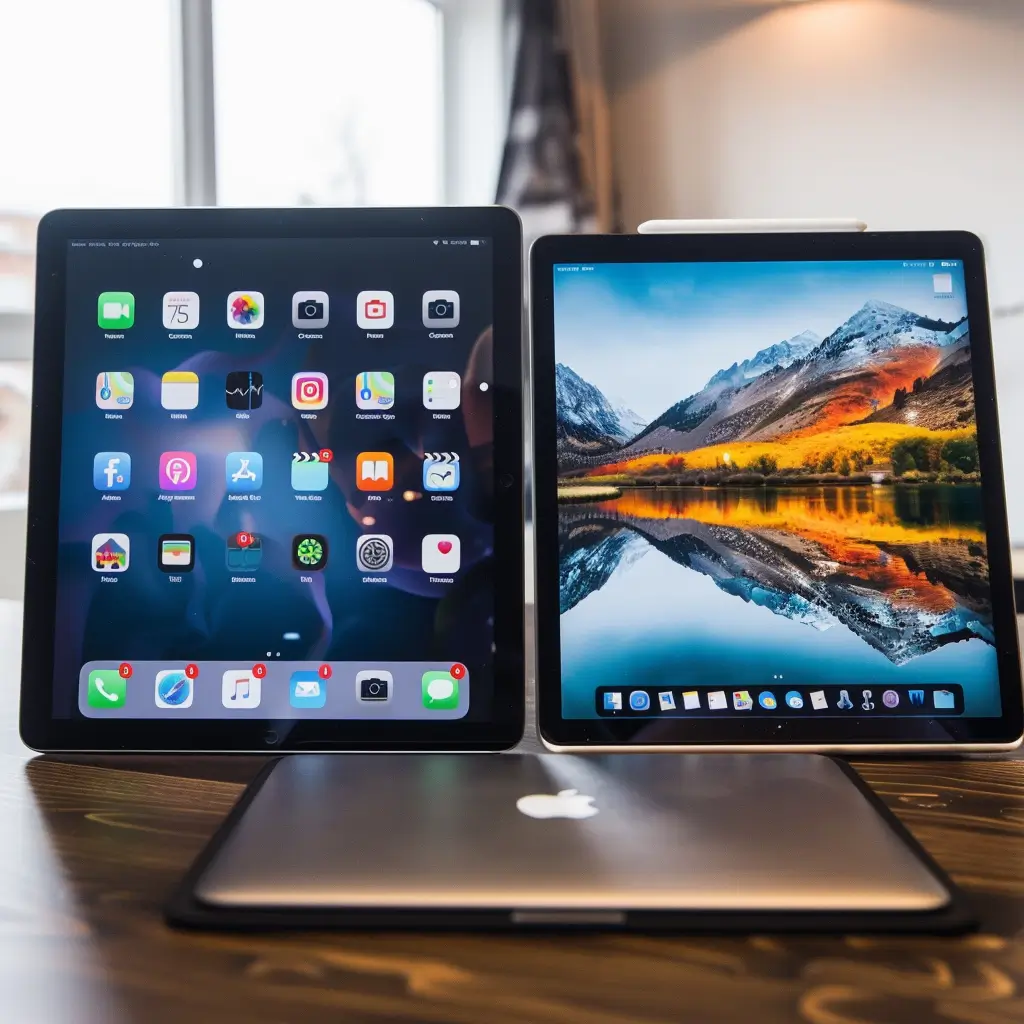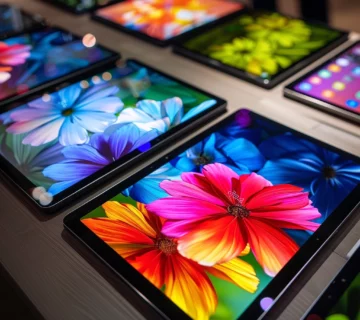In today’s tech-driven world, deciding on a tablet or laptop can be challenging. Each device offers unique features and benefits tailored to different user needs. By understanding the key differences, you can make an informed choice.
Tablet vs Laptop
Evolution of Portable Devices
Portable computing has evolved significantly. Initially, laptops dominated the market. However, the introduction of tablets has provided an alternative. Tablets offer more flexibility for casual use, while laptops remain potent workhorses.
Importance of Choosing the Right Device
Choosing a suitable device is crucial. It impacts productivity, entertainment, and daily convenience. Your choice should reflect your specific requirements, whether for work, study, or leisure.
Design and Portability
Weight and Size Comparison
Tablets are generally lighter and more compact. They are easier to carry around, fitting snugly into backpacks or purses. Laptops, while portable, are often bulkier and heavier.
Ease of Transportation
Tablets excel in portability, making them ideal for travel. Their slim design allows for easy transportation. Laptops, though portable, can be cumbersome during travel.
Performance and Capabilities
Processing Power
Laptops typically boast more powerful processors. This makes them suitable for demanding tasks like video editing and gaming. While improving, tablets still need to catch up in raw power.
Multitasking Abilities
Laptops handle multitasking better. Their operating systems and hardware support running multiple applications seamlessly. Tablets are improving, but can struggle with heavy multitasking.
Operating Systems: Tablet vs Laptop
iOS and Android for Tablets
Tablets mainly run on iOS or Android. These systems are user-friendly and optimized for touchscreens, and they offer a wide range of apps tailored for tablets.
Windows and macOS for Laptops
Laptops primarily run on Windows or macOS. These operating systems offer robust functionality and support a wide range of professional software.
User Interface
Touchscreen Interaction
Tablets are designed with touchscreens, providing intuitive interaction. This makes them ideal for activities like browsing and media consumption. Laptops also offer touchscreens, though they rely heavily on keyboards and mice.
Keyboard and Mouse
Laptops have built-in keyboards and trackpads, essential for tasks requiring precise input. Tablets can connect to external keyboards but often lack the tactile feedback of laptop keyboards.
Battery Life
Average Battery Duration
Tablets generally offer longer battery life. They are optimized for energy efficiency and can last up to 10 hours. Laptops typically provide 5-8 hours of battery life, depending on usage.
Factors Affecting Battery Life
Battery life varies with usage. Intensive tasks drain batteries faster. Screen brightness, background apps, and connectivity also impact battery duration on both devices.
Connectivity Options
Wireless Connectivity
Both tablets and laptops offer robust wireless connectivity. Wi-Fi and Bluetooth are standard features, ensuring seamless internet and device connections.
Ports and Expandability
Laptops generally have more ports, such as USB, HDMI, and Ethernet. This expandability supports additional devices and peripherals. Tablets have fewer ports and rely on wireless solutions or adapters.
Storage Capacity
Built-in Storage
Laptops typically offer more built-in storage. Hard drives and SSDs in laptops provide ample space for files and software. Tablets have limited storage, though higher-end models offer more capacity.
Expandable Storage Options
Some laptops and tablets offer expandable storage via SD cards or external drives. This flexibility is beneficial for users needing extra space.
Productivity and Work Use
Software Availability
Laptops support a more comprehensive range of professional software. Notebooks have more robust applications for programming, design, and office tasks. Tablets have productivity apps but may lack advanced features.
Typing and Document Handling
Typing is more efficient on laptops due to physical keyboards. Document handling and editing are smoother. Tablets can connect to keyboards, but the experience varies.
Entertainment and Media
Streaming and Multimedia Use
Tablets excel in streaming and multimedia consumption. Their portable design and high-resolution screens enhance the viewing experience. Laptops also offer excellent media capabilities with larger screens and better audio.
Gaming Capabilities
Laptops are generally better for gaming. They support a more comprehensive range of games and offer better graphics. Tablets have a growing game library but can’t match the performance of gaming laptops.
Price and Value
Initial Cost
Tablets are usually more affordable initially. Entry-level models offer great value for casual use. Laptops tend to be pricier, reflecting their advanced capabilities.
Long-Term Investment
Laptops offer better long-term value. Their upgradability and higher performance extend their useful life. Tablets, while durable, may become obsolete faster due to limited upgrade options.
Security Features
Built-in Security
Both tablets and laptops have built-in security features. Tablets often include biometric authentication, while laptops offer comprehensive security software and encryption options.
Additional Security Measures
Users can enhance security with additional software. VPNs, antivirus programs, and secure browsers are available for both devices, improving online safety.
Accessibility and Ergonomics
Ease of Use
Tablets are user-friendly, with simple interfaces and intuitive controls. Laptops offer greater functionality, which can be complex but versatile.
Physical Comfort
Tablets are more comfortable for casual use, allowing relaxed positions. Laptops require a more structured setup, which can cause discomfort over long periods.
Educational Uses
Tablets in Education
Tablets are increasingly popular in education. Their interactive apps and portability make them excellent learning tools for students of all ages.
Laptops for Students
Laptops remain essential for higher education. Their comprehensive software support and multitasking capabilities are ideal for research and assignments.
Creative Uses
Digital Art and Design
Tablets are favored for digital art. Stylus support and touchscreens provide a natural drawing experience. Laptops, however, offer more powerful design software.
Video and Audio Editing
Laptops are better suited for video and audio editing. They support high-end software and offer superior processing power for rendering and editing tasks.
Travel and Mobility
Tablets for On-the-Go
Tablets are perfect for on-the-go use. Their lightweight design and long battery life make them ideal travel companions.
Laptops for Work Travel
Laptops are necessary for work travel. Their functionality and performance support professional tasks, making them indispensable for business trips.
Future Trends
Technological Advancements
Technological advancements continue to blur the lines between tablets and laptops. New features and improvements enhance their capabilities, making both more versatile.
Market Predictions
Market trends suggest increasing feature integration. Hybrid devices and advanced tablets may dominate, offering the best of both worlds.
Environmental Impact
Energy Consumption
Tablets generally consume less energy. Their efficient design contributes to lower power usage. Laptops, while improving, still use more energy.
E-Waste Considerations
Both tablets and laptops contribute to e-waste. Proper disposal and recycling are essential to minimize environmental impact.
Hybrid Devices
2-in-1 Laptops
2-in-1 laptops offer the functionality of both tablets and laptops. They feature detachable or foldable designs, providing versatility.
Detachable Tablets
Detachable tablets also serve as hybrid devices. They combine tablet portability with laptop functionality, appealing to users seeking flexibility.
Conclusion: Tablet vs Laptop
Choosing between a tablet and a laptop depends on your specific needs. Tablets offer portability and ease of use, making them ideal for casual tasks. Laptops provide superior performance and multitasking capabilities, essential for professional and educational use. Consider your priorities to make the right decision.



